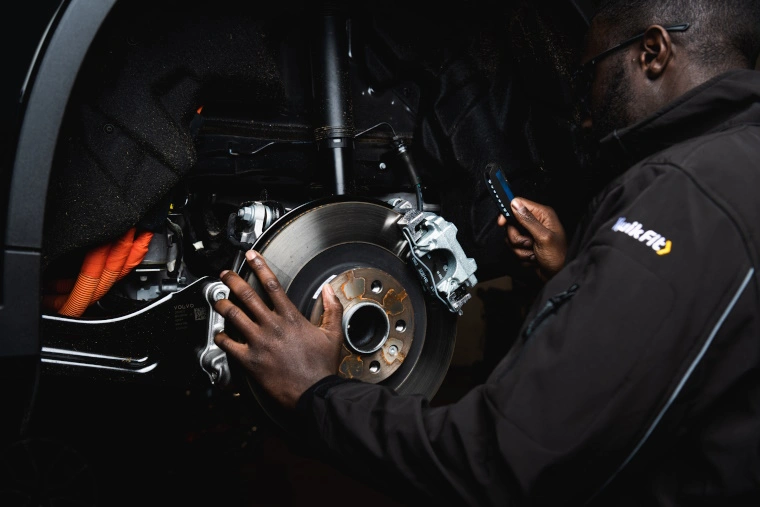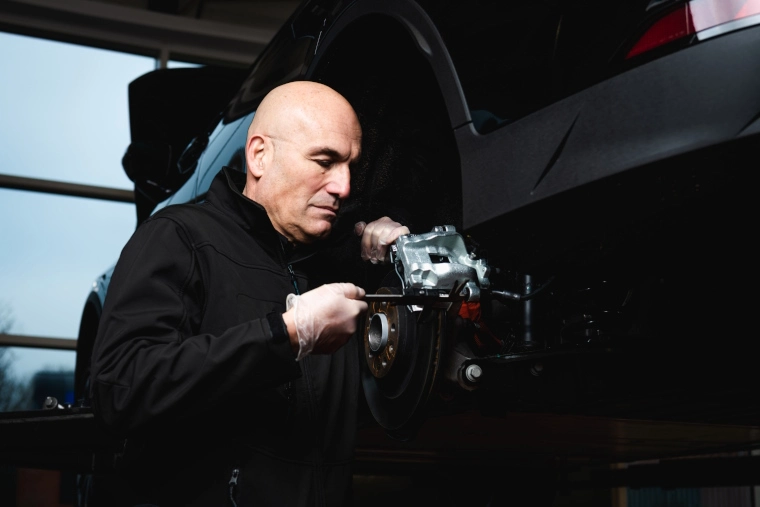Car Brake Checks & Replacement at Kwik Fit
Book your Car Brake Check Appointment at Kwik Fit
If you are concerned about the performance of your car's brakes or would like them checked before going on a long journey, please book an appointment at your local Kwik Fit centre.
Here, our expert brake technicians will complete a free, no-obligation car brake inspection. After the inspection, we will also provide you with a written brake report and a quote for any work which is required.
Please enter your vehicle registration below and click 'Search'.
Please note: free brake checks on hybrid/electric vehicles are currently available at selected centres only.
When do I need a car brake inspection?
There are a number of tell-tale signs to look out for when using your car's brakes.
Grinding
When the friction material on brake pads is heavily worn, it can result in a grinding noise as the brake pad has worn down to the metal caliper. This will likely damage the brake disc also.
Squeaking
There are many reasons why car brakes squeal. Squeaking could suggest that the brake calliper has stuck and the brake pad remains partially applied to the disc. However, some brake pads have wear indicators that squeak when worn to let the driver know the brakes need changing. Either way, you should get any squeaking checked out. Find out more about the different types of noises your brakes might make and what they mean in this blog.
Pulsating
If you feel a continuous pulsating from your car's brake pedal whenever you apply the brakes, the brake disc may have become warped due to excessive heat. Pulsation occurs because the brake disc is distorted and no longer provides a perfectly flat surface when the brake pad makes contact. If this only occurs when you apply the brakes firmly, it could just be the ABS kicking in. However, you should have pulsating brakes checked out if you are concerned or it happens regularly.
Vehicle Pulling
If your car pulls to the left or right when you apply the brakes, you may have a sticking hydraulic or mechanical component such as a seized calliper. An inspection can identify the precise reason for the vehicle pulling to one side.
Sponginess
Does the car brake pedal feel spongy and unresponsive? This is a sign that air has entered the brake's lines and is preventing the brake fluid from flowing through this system effectively.
Soft Brake Pedal
If the car brake pedal is limp and goes all the way to the floor, this indicates a serious braking system fault which you should have inspected immediately. A brake pedal that is soft and can be applied all the way to the floor usually means the brake fluid is ineffective and needs replacing. However, there can be several other potential reasons such as a master cylinder fault.
Brake Warning Light
If a brake warning light appears on your instrument panel either continuously or when you apply the brakes, it could mean the car brake fluid level is critically low. Most cars will have multiple brake warning lights for different scanerios – one for brake fluid, another for the braking system electronics. There will also be a separate light for the electronic parking brake if fitted. For practical action on what to do if a brake warning light comes on, why not read our blog piece?
High Handbrake
If the handbrake is pulling up higher than it normally does, it may need adjusting. In modern cars, this is usually anything more than 6 to 8 clicks. If the handbrake lever reaches the end of its travel, it will fail the MOT, so it is worth getting it checked.
Regular brake checks are an important part of any vehicle's preventative maintenance plan. Car brake checks can identify a problem before it begins to impact your braking efficiency, thus providing an opportunity to restore the effectiveness of your vehicle's braking system to its intended operating performance.
Old Brake Fluid
- If your brake fluid is over 2 years old, it may be losing its effectiveness. This is down to its hygroscopic properties that allow it to absorb moisture over time, affecting the properties of the fluid which negatively impacts braking ability. Brake fluid should be changed approximately every two years but check your manufacturer's handbook just to be sure.
For safety's sake, it's important to have your vehicle inspected as quickly as possible when you notice any of the above symptoms. We have an entire blog dedicated to explaining the core brake problems and signs if you’d like to find out more.

Your Kwik Fit Brake Check
At Kwik Fit, we know how important the regular inspection and maintenance of your car's brakes can be to ensure they continue to work effectively. We have over 600 brake specialists nationwide who are fully trained and committed to maintaining your brakes in an expert and cost-effective manner.
Find out what components the Kwik Fit car brake inspection covers.
What components does the brake inspection cover?
Our comprehensive brake check begins with a preliminary road test to check the braking system followed by a series of inspections in the following key areas:
- Static test – We check the condition and static operation of the braking system to ensure it is safe to road test including pedal travel, servo operation, low speed brake performance and brake light operation.
- Initial Road test – we road test the vehicle to check for braking faults or issues.
- Pads & Shoes – We will measure the pads or shoes for wear and also check for damage.
- Wheel Cylinder – We will examine the cylinder assembly and master cylinder for damage or fluid leaks.
- Disc Brake Calipers – We will examine the calipers, hoses and pipes, checking for damage or fluid leaks around each brake unit.
- Brake pipes and hoses – We will check the for leaks, condition and security of the hydraulic pipes and hoses
- Precision Inspection – We will measure the discs or drums for wear as well as reporting any damage.
- Parking brake – We will report the condition and operation of the parking brake (hand brake), including electrically operated systems.
- Brake Fluid – We will check the quality of the brake fluid to ensure it still lubricates effectively and has not taken in a high level of moisture.
- Final Road Test – to check the braking system is working effectively.
How often should car brakes be replaced?
Different driving patterns have a dramatic effect on how often your car's brakes need servicing.
For example, a set of brake pads could last up to 60,000 miles or more on a car driven mostly on the motorway. However, the brakes on the same car driven mostly in busy city centre traffic may last only 25,000 miles or less.
Front brakes normally wear out before rear brakes because they handle a higher percentage of the braking load, especially on front-wheel drive cars.
It is often recommended that car brake pads should be replaced if the pad friction material has worn down to a thickness of 3 millimetres. Brake disc thickness should be measured if they are at or below the manufacturer's safe minimum thickness specification they should be replaced.
While it is possible to measure your brake disc thickness yourself, it is extremely difficult and requires specialist equipment. Firstly, your vehicle needs to be lifted with a jack; then, you’ll need to remove the wheels before measuring. That being said, it’s better left to the experts.

More about your car's brakes…
Kwik Fit also recommends that car brake discs or drums are replaced in axle sets. Replacing one brake disc or drum could cause an imbalanced braking performance that could lead to further premature wear.
When new parts are fitted, it's vital to drive gently and carefully until they bed in. This takes approximately 200 miles. Excessive braking action on new parts can potentially damage them and lead to a loss of braking efficiency and performance.
As best practice for drivers whose annual mileage is considered average or high (around 8,000 miles per year or more), Kwik Fit recommends that your vehicle's braking system is checked at least twice a year. You may also want to check your braking system before a long journey or in advance of your MOT. Did you know that your vehicle will fail its annual MOT test if your braking system does not meet the required standards to allow your vehicle to come to an efficient stop?
Lifetime guarantee
To ensure your car brakes are always at their best, we offer a unique brakes lifetime guarantee. Once you have pads or shoes fitted at Kwik Fit, the replacement of these parts when they wear out is absolutely free to you, as long as you own the car.
Additionally, we will guarantee all other new brake parts fitted for the first 12 months after or the first 12,000 miles (whichever comes first).
Car brake FAQs
For any specific car brake queries you might have, find answers straight from the experts below.
General brake questions
Brake repair and replacement servicing questions
Still have questions? Get in touch with the team of experts at your local Kwik Fit centre and they can speak with you directly about your brake queries.

